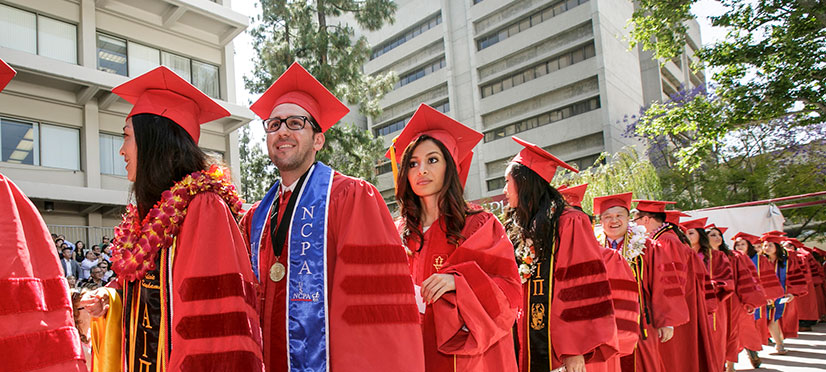Michal Mingura typifies the drive of USC Mann’s class of 2016. A postgraduate year 1 (PGY-1) community pharmacy resident at Oregon State University, she manages the pharmaceutical care of diabetic and tuberculosis patients, performs a rotation with a psychiatrist, works at the student health pharmacy, and is devising a plan to better coordinate the care provided by the medical and pharmacy departments, among other duties — all while conducting her own research.
“Ultimately, I want to combine clinical practice, research and teaching,” she says. So the residency has put her well on her way — as did the training she received at USC.
Since graduating last May, Mingura and her fellow alumni have shared their impressive skills throughout the public and private sectors. As they embark on new careers in pharmacies, hospitals, drug companies and other pharmacy-related field, communities nationwide already are benefiting from their diligence in clinical practice — just as they will ultimately benefit from their innovative research.
Given the class’s impressive statistics, the pathways to success were never in doubt. According to the California State Board of Pharmacy, the school’s class of 2016 had a 97.4 percent North American Pharmacist Licensure Examination (NAPLEX) pass rate — the highest in California — and a 91 percent California Practice Standards and Jurisprudence Examination for Pharmacists (CJPE) pass rate, the second highest in the state.
Nor was their commitment to the field in question. All 2016 graduates said that planned to go into a pharmacy-related field, with many saying they planned to work at a hospital or community pharmacy post-graduation.
“I didn’t realize how well USC prepared me for residency and my career as a pharmacist until I started my program,” says Jackie Benjamin, who is currently a PGY-1 at Providence Health & Services in Portland, Oregon. “USC’s classes are challenging for a reason — the professors teach the material extremely thoroughly. My pharmacology baseline knowledge is really strong, and I know it’s because I was taught well.”
Jason Chen, a PGY-1 pharmacy resident at City of Hope, agrees. In addition to the “strong clinical background” provided by the school’s curriculum and rotation experiences, he cites USC’s extracurricular activities as fundamental to improving his skills and knowledge. “Participating in these organizations allowed me to learn about the different opportunities available to pharmacists and also strengthened my skills in project management, presentation and other areas,” he says.
Karey Kowalski — who oversees clinical pharmacology at a company in San Diego focused on developing precision oncology small molecule therapeutics — adds another advantage offered by the school: its interdisciplinary training. “The opportunity to learn from both PhD and PharmD professors has enabled me to communicate broadly from basic science to clinical application, which has proved useful in cross-departmental interactions,” she says. “As the only PharmD at my company, I feel my degree has provided a vital and unique perspective in drug development.”
Learn more about USC School of Pharmacy recent graduates.


